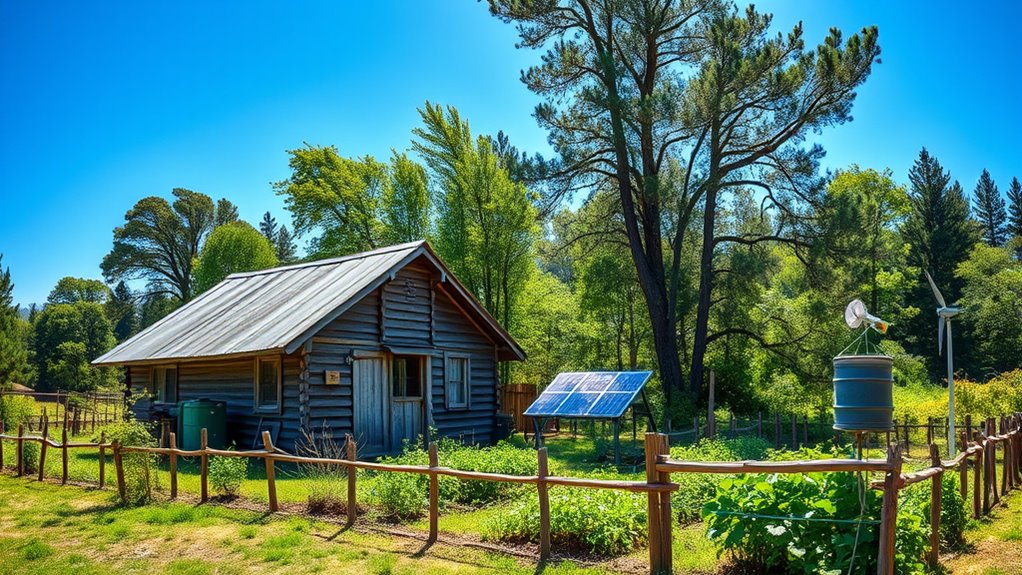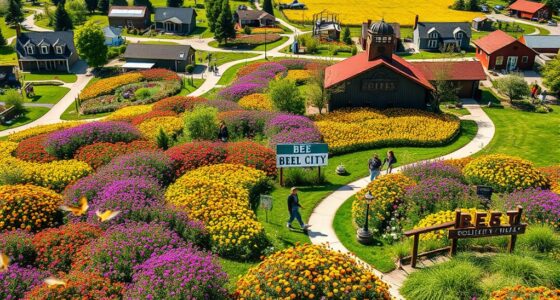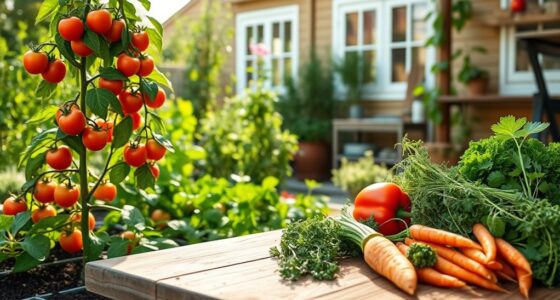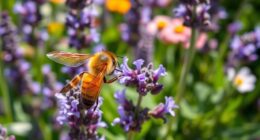Living off the grid requires mastering self-sufficiency by harnessing solar power and conserving water. You’ll need to install solar panels, store energy in batteries, and reduce your water use through strategies like rainwater collection and low-flow fixtures. Sustainable practices help you lower your ecological impact and build resilience. As you develop resourcefulness and adapt your habits, you’ll create a self-reliant, environmentally conscious homestead—if you stay committed, you’ll uncover even more valuable lessons along the way.
Key Takeaways
- Emphasize the importance of solar power systems with battery storage for reliable, renewable energy.
- Implement water conservation techniques like rainwater harvesting and greywater reuse.
- Develop habits of resource monitoring and efficient appliance use to minimize ecological impact.
- Adapt a resilient mindset focused on self-sufficiency, sustainability, and environmental harmony.
- Continuously learn and refine sustainable practices to ensure long-term independence and resource management.

Living off the grid means choosing to live independently from public utilities like electricity, water, and sewer systems. It’s a lifestyle that demands self-sufficiency and careful planning, especially when it comes to harnessing energy and managing water resources. One of the most effective ways to generate your own power is through solar power. Setting up solar panels allows you to convert sunlight into usable electricity, reducing your reliance on fossil fuels and lowering your energy bills. With advances in solar technology, you can now install systems that store excess energy in batteries, ensuring you have power during cloudy days or at night. This setup not only keeps your homestead running smoothly but also minimizes your carbon footprint, making your lifestyle more sustainable.
Living off the grid with solar power reduces reliance on fossil fuels and boosts sustainability.
Water conservation plays a critical role in living off the grid, especially when your water supply comes from a well or rain catchment. You learn quickly to use water wisely, prioritizing essential needs like drinking, cooking, and hygiene. Simple practices like fixing leaks promptly, installing low-flow fixtures, and using greywater systems help stretch your water supply further. Collecting rainwater is a common method to supplement your needs, but it requires careful filtration and maintenance to ensure water quality. You might also consider composting toilets or alternative sewage solutions to minimize water use and reduce environmental impact. Every drop counts, and thoughtful water management becomes second nature with experience. Additionally, understanding sound vibrations and their influence on health can inspire you to incorporate calming sounds into your routine, fostering a more peaceful environment.
Living off the grid isn’t just about installing solar panels and conserving water; it’s also about adopting a mindset of resilience and resourcefulness. You’ll learn to monitor your energy consumption, turning off appliances when they’re not in use, and choosing energy-efficient devices. Likewise, you develop habits that promote water saving, like watering plants during cooler parts of the day or collecting greywater for irrigation. These practices not only help you sustain your homestead but also foster a deeper connection to your environment. By being mindful of your resource use, you become more integrated with nature’s cycles and more responsible for your ecological footprint.
Ultimately, living off the grid requires commitment and a willingness to adapt. Using solar power and practicing water conservation aren’t just technical choices—they’re fundamental to creating a sustainable, self-reliant lifestyle. As you gain experience, you’ll find that these habits become second nature, empowering you to live more harmoniously with the environment while enjoying the independence that comes from being off the grid.
Frequently Asked Questions
How Do You Handle Medical Emergencies off the Grid?
When handling medical emergencies off the grid, you rely on your well-stocked first aid kits and established emergency protocols. You stay calm, assess the situation quickly, and provide immediate care as needed. You also prepare by learning basic first aid skills and having clear plans for contacting help if possible. This way, you guarantee safety and effective response until professional medical assistance can be reached or the situation resolves.
What Are the Legal Requirements for Off-Grid Living?
You should first research local zoning restrictions and legal permits required for off-grid living in your area. These regulations vary widely and may include building codes, water rights, and waste disposal rules. Contact local authorities or planning departments to guarantee you’re compliant. Obtaining the necessary permits before setting up your homestead helps you avoid fines or legal issues, making your off-grid lifestyle sustainable and worry-free.
How Do You Ensure Consistent Water Supply?
To guarantee a consistent water supply, you should implement rainwater harvesting systems and store sufficient water for dry periods. Regularly clean and maintain your collection setup to prevent contamination. Use water filtration to purify the collected rainwater, making it safe for drinking and household use. By combining these methods, you create a reliable, sustainable water source that supports your off-grid lifestyle year-round.
What Are the Initial Costs for Setting up a Homestead?
Did you know that starting a homestead can cost between $10,000 and $50,000? Your initial setup includes solar panels, which might be $5,000 to $15,000, and composting toilets, roughly $1,000. You’ll also need land, permits, and basic supplies. While the upfront costs are significant, investing in renewable energy and eco-friendly systems pays off in long-term savings and sustainability.
How Do You Preserve Food Without Modern Refrigeration?
To preserve food without modern refrigeration, you can use fermentation techniques like fermenting vegetables or dairy, which also boost flavor and nutrition. Root cellaring is another effective method, storing hardy produce in cool, dark places to extend shelf life naturally. These techniques help you maintain a supply of fresh food year-round, reducing waste and reliance on electricity, making your homestead more sustainable and self-sufficient.
Conclusion
Living off the grid is like planting seeds of independence in the rich soil of self-sufficiency. As you nurture your homestead, you become the steady heartbeat of a resilient ecosystem, weathering storms and basking in sunlight. Each lesson learned is a drop of dew on a leaf—quiet yet essential. Embrace this path, and you’ll find that freedom isn’t just a distant horizon, but the steady rhythm of your own wild, sustainable symphony.









